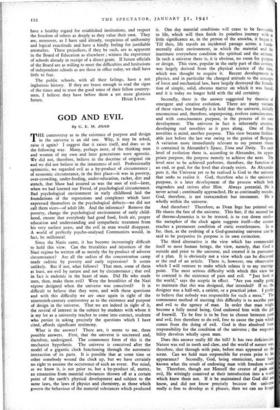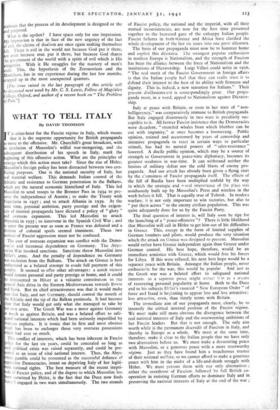GOD AND EVIL
By C. E. M. JOAD THE controversy as to the existence of purpose and design in the universe is an old one. Why, it may be asked, raise it again? I suggest that it raises itself, and does so in the following way. Many, perhaps most, of the thinking men and women of my own and later generations were agnostic._ We did not, therefore, believe in the doctrine of original sin and we did not believe in the innateness of evil. Professionally optimistic, we regarded evil as a by-product of circumstance ; of economic circumstance, in the first place—it was in poverty, over-crowding, under-feeding, under-education, racket, dirt and stench, that Shaw had assured us was the root of evil—later, when we had learned our Freud, of psychological circumstance. Bad psychological environment in early childhood laid the foundations of the repressions and complexes which later expressed themselves in the psychological defects—we did not call them vices—of adult life. And the inference? Remove the poverty, change the psychological environment of early child- hood, ensure that everybody had good food, fresh air, proper education and understanding and sympathetic treatment from his very earliest years, and the evil in man would disappear. A world of perfectly psycho-analysed Communists would, in fact, be millennial.
Since the Nazis came, it has become increasingly difficult to hold this view. Can the brutalities and injustices of the Nazi regime be written off as merely the by-product of adverse circumstance? Are all the sadists of the concentration camp made sadistic by poverty and early repression? It seems unlikely. But if not, what follows? That men, some of them at least, are evil by nature and not by circumstance ; that evil in fact is endemic in the heart of man. Did He who made men, then, make them evil? Were the brutalities of the Nazi regime designed when the universe was conceived? It is difficult to believe that they were, and with these questions and with this difficulty we are once again in sight of the nineteenth-century controversy as to the existence and purpose of design in the universe. That we are indeed in sight of it, the revival of interest in the subject by students with whom it is my lot as a university teacher to come into contact, students who persist in asking precisely the questions which I have cited, affords significant testimony.
What is the answer? There are, it seems to me, three possible answers. First, that the universe is uncreated .and, therefore, undesigned. The commonest form of this is the mechanist hypothesis. The universe is conceived after the model of a gigantic clock functioning through the automatic interaction of its parts. It is possible that at some time or other somebody wound the clock up, but we have certainly no right to assume the occurrence of such an event. For mind, as we know it, is not prior to, but a by-product of, matter, an emanation from material substances thrown off at a certain point of the earth's physical development and subject to the same laws, the laws of physics and chemistry, as those which govern the behaviour of the material substances which produced it. One day material conditions will cease to be favourable to life, which will then finish its pointless journey with as little significance as, in the person of the amoeba, it began it. Till then, life travels an incidental passage across a funda. mentally alien environment, in which the material and the inanimate everywhere condition the spiritual and the animate. In such a universe there is, it is obvious, no room for purpose or design. This view, popular in the early part of this century, was largely derived from the physical science of the time, which was thought to require it. Recent developments in physics, and in particular the changed attitude to the concepts of force and mechanical law, have largely destroyed the founda- tion of simple, solid, obvious matter on which it was based, and it is today no longer held with the old certainty.
Secondly, there is the answer suggested by theories of emergent and creative evolution. There are many variants of these views, but broadly it is held that the universe, initially unconscious and, therefore, unpurposing, evolves consciousness, and with consciousness purpose, in the process of its own development. The universe in fact is inherently creative, developing real novelties as it goes along. One of these novelties is mind, another purpose. This view became fashion- able just before the last war owing to the genius of Bergson. A variation more immediately relevant to my present theme is contained in Alexander's Space, Time and Deity. To each level of evolution there is, according to Alexander, its appro- priate purpose, the purpose namely to achieve the next. The level next to be achieved performs, therefore, the function of an end, or goal, for the level that already exists. As Alexander puts it, the Universe yet to be realised is God to the universe that seeks to realise it. God, therefore who is the universe's purpose, is a later development of the process which both engenders and strives after Him. Always potential, He is never actual ; continually approached, He as continually recedes. God, therefore, is not transcendent but immanent. He is wholly within the universe.
And therefore? Therefore, as Dean Inge has pointed out, He shares the fate of the universe. This fate, if the second law of thermo-dynamics is to be trusted, is to run down until— the metaphor of the clock again suggests itself—the cosmos reaches a permanent condition of static eventlessness. In so far, then, as the evolving of a God-generating universe can be said to be purposive its purpose is its own extinction.
The third alternative is the view which has commended itself to most human beings, the view, namely, that God is outside and prior to the universe, and created it in pursuance of a plan. It is obviously not a view which can be discussed at the end of an article. There is, however, one observation which I will venture to make which relates it to my starting point. The most serious difficulty with which this view has to contend is the existence of pain and evil. "Just look at the world," says the sceptic in effect. "Are you really going to maintain that this was designed, that intended? If so, the designer was a half-wit, a satirist, or a practical joker. I prefet to believe that nobody was responsible for such a mess." The commonest method of meeting this difficulty is to ascribe pain and evil to the agency of man. In order that man might become a fully moral being, God endowed him with the gift of freewill. To be free is to be free to choose between good and evil, free therefore to do evil, free to cause the pain which comes from the doing of evil. God is thus absolved from responsibility for the condition of the universe ; the respondbility devolves wholly upon man.
Does this answer really fill the bill? It has two deficiencies. Nature was red in tooth and claw, and the world of nature was, therefore, shot through with pain, before man appeared on the scene. Can we hold man responsible for events prior to his appearance? Secondly, God, being omniscient, must have known what the result of endowing man with freedom would be. Therefore, though not Himself the creator of pain and evil, He wittingly connived at their introduction into a world which knew them not. If it be maintained that God did 136 know, and did not know precisely because the universe really is free to develop as it pleases, then we can no longer aintain that the process of its development is designed or the nd purposed.
What is the upshot? I have space only for one impression. ly impresFion is that in face of the new urgency of the fact f evil, the claims of dualism are once again making themselves eh. There is evil in the world not because God put it there, ot even because man put it there, but because God shares the government of the world with a spirit of evil which is His tagonist. With it He struggles for the mastery of men's ouls. This, the hypothesis of the Zoroastrians and the anichees, has in my experience during the last few months, ropped up in the most unexpected quarters.
[The issue raised in the last paragraph of this article will e discussed next week by Mr. C. S. Lewis, Fellow of Magdalen allege, Oxford, and author of a recent book on "The Problem f Pain."]































 Previous page
Previous page